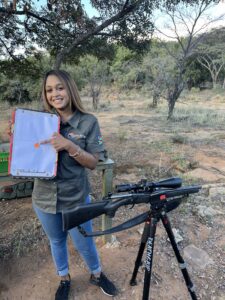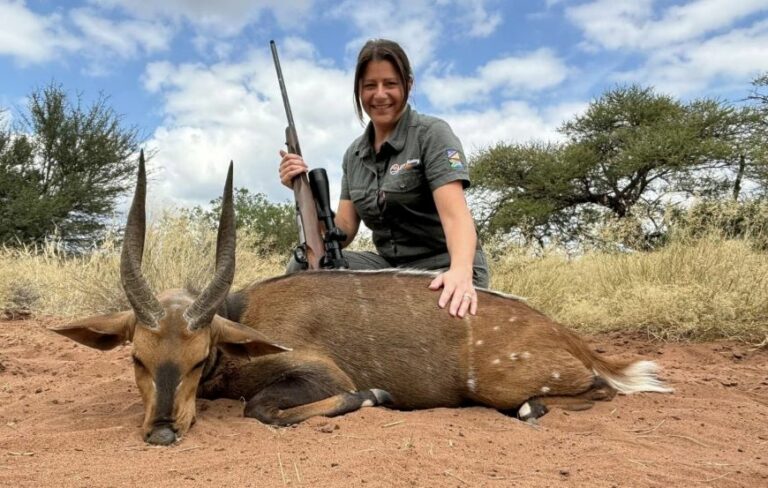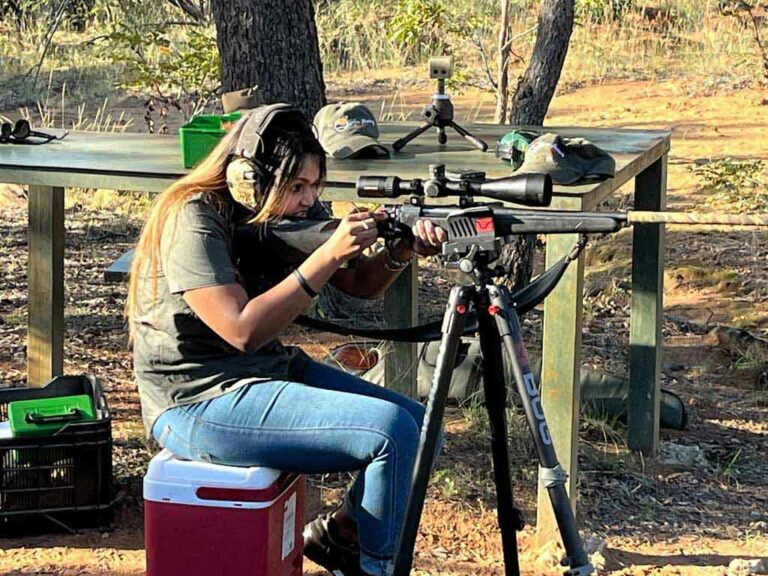Safari hunting has long been a way for us to connect with nature and test our skills, but it often comes with ethical and environmental concerns. Virtual reality (VR) safari hunting offers a modern solution, blending the thrill of the hunt with advanced technology while leaving wildlife and ecosystems untouched.
With VR, we can experience the excitement of tracking game in realistic landscapes without leaving our homes. It’s an immersive way to enjoy the sport, whether we’re seasoned hunters or curious beginners, all without the logistical challenges or impact of traditional safaris.
[DYNAMIC-BLOGTABLEOFCONTENT]
Key Takeaways
- Virtual Reality Safari Hunting offers an ethical and accessible alternative to traditional hunting, allowing users to experience the thrill of the hunt without harming wildlife or ecosystems.
- Immersive and Realistic VR environments provide users with opportunities to practice hunting skills and explore diverse scenarios, including iconic Big Five species and other challenging game.
- Advantages of VR Hunting include eliminating travel costs, avoiding complex legalities like permits, and fostering conservation through non-invasive methods.
- Limitations of VR include reduced physical engagement, the cost of high-quality VR equipment, and the inability to fully replicate the emotional and sensory experiences of traditional safaris.
- Ethical Importance is a key focus of VR safari hunting, promoting wildlife preservation and offering a sustainable, harm-free way to enjoy the sport.
What Is Virtual Reality Safari Hunting?
Game hunting safaris offer an unparalleled opportunity to experience the excitement of tracking and locating iconic wildlife. For enthusiasts drawn to the heritage of African hunting traditions, these safaris provide access to diverse ecosystems, legendary animals, and professional hunting guides. Let’s dive into the essentials of planning, executing, and enjoying a successful game hunting safari.
What Are Game Hunting Safaris?
Game hunting safaris are organized hunting trips that typically focus on targeting specific species of wildlife, often in Africa. These adventures combine the thrill of safari exploration with focused hunting objectives, such as African Cape Buffalo hunts or leopard hunting. Participants are guided by professional outfitters who ensure compliance with local laws and conservation efforts.
Popular Species for Hunting
Professional guides curate each safari around your interests and goals, often focusing on Africa’s famed “Big Five”—lion, elephant, Cape buffalo, rhinoceros, and leopard. But the experience doesn’t stop there. Here are just a few examples of animals frequently pursued:
- Cape Buffalo: Known for its size and aggressive temperament, this species offers a challenging hunt.
- Leopard: Often hunted at night under strict regulations, leopards test patience and skill.
- Hyena and Crocodile: These require specialized knowledge to track and harvest due to their elusive behavior.
- Plains Game: Includes kudu, sable, and impala, providing an excellent starting point for newcomers.
Planning Your Safari
Preparation plays a central role in any hunting safari. Here’s what we recommend considering:
- Choose the Right Location: Hunting in South Africa offers diverse game and reliable outfitters, while nations like Namibia and Tanzania are ideal for specific game like lions and elephants.
- Secure Permits: Work with an African Hunting Safari Broker to navigate legal requirements and permits. Consult local authorities or outfitter agencies to confirm regulations.
- Gear Up: Make sure equipment matches your hunt. For instance, using powerful rifles like .375 H&H is often necessary for big game hunting in Africa.
Conservation and Ethics
Sustainable practices lie at the heart of game hunting safaris. Reputable operators emphasize ethical practices, ensuring no species is overhunted or poached. Proceeds from hunting trips in Africa often contribute directly to local wildlife protection programs and community development initiatives.
- Practice Shooting Accuracy: Flawless precision matters, whether it’s lion hunting in Africa or capturing plains game.
- Acclimatize to Environments: Spend time getting used to weather conditions and terrains before attempting demanding hunts like hippo hunts.
- Respect Local Cultures: Engage respectfully with guides and communities to deepen your connection with the experience.
To book your dream hunting safari or find more about specialized trips, check out Game Hunting Safaris.
Game hunting safaris offer an unparalleled opportunity to experience nature while connecting with some of the most iconic wildlife species. From tracking cape buffalo in dense bushlands to encountering the elusive leopard at dusk, these safaris combine adventure, strategy, and respect for wildlife. Whether you’re a seasoned hunter or a curious beginner, there’s a lot to learn about how to make the most of this unforgettable journey.

Key Features Of Virtual Reality Safari Hunting
Preparation is key to a successful African hunting safari. It’s not just about booking a trip—there’s a process to follow that blends research, strategy, and the right mindset.
Choosing The Right Location
Africa’s vast landscapes provide diverse hunting opportunities depending on your preferences. Countries like South Africa, Namibia, and Zimbabwe are popular for their rich ecosystems and varied game species. For those seeking big game hunting, the Big Five—lion, elephant, cape buffalo, rhinoceros, and leopard—should top the list. On the other hand, enthusiasts looking to expand their experience might consider specialized hunts for species like hyena, hippo, or crocodile.
Explore different regions and their offerings. For example, South Africa hosts premier hunting areas where lion hunting aligns with strict conservation policies. Meanwhile, Zimbabwe’s terrain is ideal for cape buffalo hunts, blending challenging conditions with scenic environments.
Setting Up Permits And Legalities
Securing hunting permits ensures ethical and lawful participation. Local regulations vary by country and type of game, so work closely with experienced operators like African Hunting Safari Broker. Trustworthy brokers simplify the process of acquiring permits while staying compliant with international and local regulations.
Additionally, it’s worth confirming the export and trophy regulations in advance. For instance, leopard hunting may come with specific export constraints, making prearranged paperwork essential.
Preparing Gear And Training
Bringing proper gear can elevate the safari experience. Rifles suited for large game, resilient boots for rugged terrain, and camouflaged clothing are just the basics. For those heading out on African cape buffalo hunts, higher-caliber rifles are crucial for clean, ethical kills.
Practice shooting accuracy before your trip to ensure effective, humane hunting. Many outfitters recommend shooting ranges optimized for safari-style distances, preparing participants for real-life scenarios.
Tips For A Memorable Experience
Small details can make or break your hunting trip.
- Physical Fitness: Long walks, changing altitudes, and challenging weather conditions can be tough. Build endurance through consistent exercise prior to traveling.
- Cultural Sensitivity: Respect local practices and traditions. Engaging with local cultures enriches the overall experience as communities often play an active role in safeguarding ecosystems.
- Guided Tours: Always choose reputable operators like “Game Hunting Safaris” who prioritize safety and ethical practices. Their seasoned guides ensure an organized, rewarding outing.
Ethical Hunting Practices
Today’s hunters contribute to sustainable wildlife management. Ethical safari hunting ensures that wildlife populations remain balanced while providing resources for local communities. For instance, lion hunting in Africa often operates under strict quotas to prevent overhunting.
Supporting operators who prioritize conservation is critical. Trustworthy groups invest back into habitat restoration, anti-poaching initiatives, and educational programs for nearby villages. Plus, they assist in promoting fair practices, ensuring species like the African cape buffalo are hunted responsibly.
For more details or to plan your next safari, check out Game Hunting Safaris to stay informed and connected with professional outfitters.

Pros And Cons Of Virtual Reality Safari Hunting
Virtual reality safari hunting combines the thrill of traditional hunting with cutting-edge technology, offering an innovative approach to experiencing African game while preserving wildlife. As we weigh the benefits against the limitations, this section highlights the key factors shaping this modern alternative.
Advantages Of Virtual Reality Safari Hunting
- Ethical Experience
VR safari hunting eliminates harm to animals, promoting an ethical and sustainable way to engage with hunting. By simulating African big game hunts, like lion hunting in Africa or leopard hunting, enthusiasts can enjoy the challenge without impacting ecosystems or wildlife populations. - Accessibility
Participants can experience the excitement of Game Hunting Safaris without traveling to remote locations. VR makes immersive hunts, such as African cape buffalo hunts or crocodiles hunting, available from the comfort of home, removing logistical barriers like permits and travel expenses. - Realistic Training Tool
VR offers a safe environment to practice skills like target accuracy or the patience needed for stalking prey. This is especially valuable for beginners planning future African hunting safari trips, where preparation is essential for success. - Diverse Scenarios
Players can virtually engage in various hunts, including iconic big 5 African game species, without seasonal or regulatory restrictions. The ability to switch between tracking hyenas, engaging in hippo hunts, or pursuing Africa big game hunts enhances the learning and enjoyment experience.
Disadvantages Of Virtual Reality Safari Hunting
- Limited Physical Engagement
Unlike real African hunting safaris, VR lacks the physical endurance component of stalking through diverse terrains like savannahs or wetlands. Those seeking authentic physical challenges of cape buffalo hunts or hunting in South Africa may find VR less fulfilling. - Cost Of Equipment
High-quality VR gear can be expensive, creating a financial burden for some. While the overall cost may still be lower than traditional hunting trips in Africa, it’s something to consider for those on tighter budgets. - Reduced Emotional Connection
The emotional thrill of being physically present during big game hunting in Africa—like witnessing firsthand the majesty of African landscapes and wildlife—is diminished in virtual settings. While realistic, VR can’t fully replicate the sensory experience of an African hunting safari. - Skill Transfer Limitations
Though VR hones certain skills, it doesn’t substitute for real-world factors like handling unpredictable weather, navigating terrain, or managing local regulations during traditional African hunting trips. Practical knowledge gained through actual experience remains unmatched.
Explore more hunting options and plan your next trip with a trusted African Hunting Safari Broker by visiting Game Hunting Safaris.
Safaris have long captured our imagination as thrilling escapes into the wild. Game hunting safaris elevate this experience, offering the chance to track and hunt some of the world’s most iconic species. From the majestic “Big Five” to plains game and crocodiles, these adventures require careful planning, respect for conservation, and a passion for wildlife. Let’s explore what makes these journeys so extraordinary and how to embark on one responsibly.
Popular VR Safari Hunting Games And Platforms
Game hunting safaris play a vital role in wildlife conservation and local community development. Responsible hunting operations adhere to strict regulations, ensuring that species populations remain healthy and ecosystems stay balanced. Additionally, fees from hunting permits contribute to habitat protection and anti-poaching efforts. For hunters, these trips aren’t just about the trophy—they’re about the journey, the challenge, and the connection to nature.
Top Destinations For Game Hunting Safaris
Certain regions in Africa stand out as prime destinations for hunting the Big 5 and other sought-after species.
South Africa
South Africa is renowned for diverse wildlife and well-established hunting infrastructure. From lion hunting in Africa to plains game like kudu and springbok, it’s a top choice for seasoned hunters and beginners.
Namibia
Known for its dramatic landscapes, Namibia offers excellent opportunities for tracking species like leopards and cape buffalo. Professional outfitters in Namibia also prioritize sustainable hunting practices.
Zimbabwe
Zimbabwe is a haven for elephant, buffalo, and hippo hunts. The rich biodiversity and expert guides make hunting trips in this region unforgettable.
For more insights or to plan a trip, visit Game Hunting Safaris.

Species To Hunt On Safari
The Big Five African Game
The Big Five—lion, Cape buffalo, elephant, rhinoceros, and leopard—are the stars of African big game hunting. Tracking these animals is a true test of skill and commitment.
Crocodiles And Hippos
For those seeking unique challenges, crocodiles hunting and hippo hunts provide thrilling experiences in wetland environments. Both species require patience and careful approach.
Plains Game
With species like impala, wildebeest, and warthog, plains game hunting offers variety and accessibility. These hunts are perfect for those new to African hunting safaris.
Essential Tips For A Successful Safari
Choose The Right Outfitter
Selecting a reputable African Hunting Safari Broker ensures a well-organized trip. Professionals guide you through permits, gear, and local regulations.
Preparation Is Key
Practice shooting accuracy before your trip. Get comfortable with the gear you’ll use to handle different scenarios effectively.
Respect Local Cultures
Understanding local customs and traditions enhances your experience. It also fosters goodwill with the communities you encounter.
Practice Ethical Hunting
Always adhere to hunting laws and guidelines. Ethical hunting contributes to conservation efforts and ensures a positive impact on ecosystems.
Planning Your African Hunt
It’s essential to book your safari with experienced operators like Game Hunting Safaris. Securing your permits, handling logistics, and preparing your gear are streamlined with their expertise. Plan your trip well in advance to ensure a smooth and unforgettable adventure. African big game hunts offer more than an outdoor activity—they’re a celebration of nature, tradition, and sustainability. Whether it’s lion hunting in Africa, cape buffalo hunts, or a once-in-a-lifetime hippo hunt, embarking on these safaris leaves lasting memories and contributes to conservation. Let’s make your adventure a responsible and exhilarating one.

Conclusion
Virtual reality safari hunting offers an exciting, ethical alternative to traditional hunting, combining cutting-edge technology with the thrill of the wild. It’s a game-changer for enthusiasts seeking immersive experiences without impacting wildlife or ecosystems.
For those drawn to real-world adventures, game hunting safaris remain a unique way to connect with nature while supporting conservation and local communities. Whether through VR or guided safaris, the opportunities to explore and engage responsibly are more accessible than ever.
Let’s embrace these innovations and practices to ensure our passion for hunting contributes positively to the world around us.
Frequently Asked Questions
What is the appeal of traditional safari hunting?
Traditional safari hunting offers a chance to connect with nature, track iconic wildlife, and experience adventure in diverse ecosystems, often with the guidance of professional outfitters. It combines physical challenge, skill, and the thrill of the hunt in remote, exotic locations.
What is virtual reality (VR) safari hunting?
VR safari hunting is a modern alternative to traditional hunting that uses immersive technology to replicate the hunting experience. It allows users to enjoy the thrill of hunting without harming wildlife or ecosystems, making it an ethical and accessible option.
How does VR hunting differ from real-world hunting?
VR hunting eliminates physical effort, the need for permits or travel, and the ethical concerns tied to traditional hunting. However, it can’t fully replicate the emotional connection, physical challenge, or skills required for real hunting.
What are some ethical concerns with traditional safari hunting?
Ethical concerns include the potential overhunting of wildlife, harm to ecosystems, and risks of illegal poaching. However, responsible and guided hunts often support conservation and fund community development initiatives.
Which animals are commonly hunted on game hunting safaris?
The “Big Five”—lion, elephant, Cape buffalo, rhinoceros, and leopard—are popular targets in game hunting safaris. Other animals include hippos, crocodiles, hyenas, and various plains game species like kudu and impalas.
What are the top destinations for game hunting safaris?
Popular game hunting destinations include South Africa, Namibia, and Zimbabwe. These locations are known for their diverse wildlife, regulated hunting operations, and professional outfitters.
How can hunters ensure their safari is ethical?
To ensure ethical hunting, choose reputable operators who follow strict regulations, prioritize conservation, and support local communities. Research outfitters thoroughly to avoid supporting unethical practices.
What permits are required for a hunting safari?
Hunting safari permits vary depending on the destination and target species. It’s essential to check local regulations and secure necessary documentation through your outfitter well in advance.
What equipment is essential for a hunting safari?
Key equipment includes a suitable rifle or bow, appropriate ammunition, durable clothing, reliable boots, and accessories like binoculars and GPS devices. Physical preparation and shooting practice are also vital.
How does hunting contribute to conservation?
Responsible hunting supports wildlife conservation by funding anti-poaching initiatives, habitat protection, and local communities. Reputable operations work to maintain species populations and balanced ecosystems.
What are the benefits of guided hunting safaris?
Guided safaris ensure expertise in tracking wildlife, adherence to local laws, and ethical hunting practices. Professional outfitters offer invaluable support, enhancing safety and the overall hunting experience.
What are the advantages of VR safari hunting?
VR safari hunting provides an ethical, safe, and accessible alternative to traditional hunting. It eliminates harm to wildlife, reduces travel costs, and offers an immersive experience for beginners or those unable to hunt in natural settings.
Are there any drawbacks to VR hunting?
VR hunting lacks the physical engagement and emotional connection of real-world hunts. Additionally, high-quality VR equipment can be costly, and VR skills may not seamlessly transfer to traditional hunting.
How should I prepare for a hunting safari?
Preparation includes researching locations, securing permits, selecting reliable outfitters, and practicing shooting accuracy. Physical fitness, proper gear, and cultural respect are also crucial for a successful trip.
Can I support conservation without hunting?
Yes, you can support wildlife conservation through donations, eco-tourism, or volunteering for conservation projects. Ethical tourism and supporting organizations that combat poaching are other impactful ways.
Where can I book a reliable hunting safari?
You can book specialized trips through trusted outfitters like Game Hunting Safaris. They focus on responsible hunting practices while providing professional guidance and support throughout the experience.
